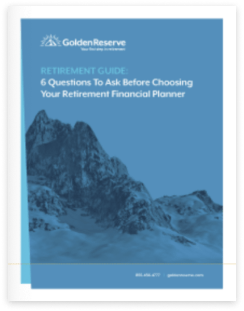Debunking the Retirement Myth: You Don’t Need 2 Million Dollars
Feeling that nagging doubt about your retirement savings? You’re not alone. A recent study found just 49%…

Three Ways to Keep More of Your Hard-Earned Money
The only thing that feels better than retiring is knowing you’ve done so with a great strategy to help minimize your tax burden. Now’s the time to live life to its fullest, and that includes keeping your wallet full. Help ensure more of your money stays in your pocket with these smart tax strategies.
Take advantage of Roth Conversions
Roth conversions can be a powerful tool, both for lessening your future tax burden, and for creating tax free income for your spouse or children. Let’s break down how it works.
Unlike a traditional 401k or IRA, Roth IRAs are not tax-deferred accounts. That can be advantageous when you consider certain scenarios where paying taxes on the money today may be better than paying taxes in the future. If you’ve read our article about ways to help ensure you have enough money in retirement, you might already be able to guess two of those scenarios: the Widow’s Tax and the Kiddo’s Tax.
Many retirees want to ensure they not only have enough money in retirement, but that they also have enough to care for their surviving family when they’re gone. Yet, your surviving family’s tax burden may be much different than yours, throwing a wrench in your plans. Simply put, while they can inherit your estate, they can’t inherit your tax rate. For example, when one spouse passes away, the other will now be subject to the individual tax rate, not the lower married rate. This is what we refer to as the Widow’s Tax. And for your children, anything they inherit will be taxed at their rate, which could be much higher, especially if they’re in their peak earning years.
Roth conversions are the smart workaround to this problem. You’ll pay income tax on funds you convert from your traditional 401k or IRA, but they may be far less than the alternative. Luckily, you don’t have to crunch the numbers alone. At Golden Reserve, our retirement financial planners and in-house CPAs can help you figure out whether this strategy is right for you.
Make the Most of Your Life Insurance
Generally, life insurance is important for everyone—working or not. We often think of life insurance as income replacement, or a mechanism to provide financial security for our loved ones; however, that’s just one of the benefits.
Life insurance can also provide a safety net in the event you need long term care, and most importantly, the benefits are usually tax-free. Some policies allow for Accelerated Death Benefits, which is a tax-free advance on your life insurance death benefit paid while you’re still alive to assist with the cost of long-term care. Typically, this is capped at 50 percent of the death benefit, with monthly benefits generally equal to 2% of the policy’s face value for nursing home care, and half that for in-home care.
Another option is a combination policy, which bundles life insurance with long-term care insurance. In this newer option, long-term care benefits are often offered as a percentage of the life insurance benefit. These policies can be expensive, but may be less limited than the benefits you’d receive under an Accelerated Death Benefit.
The tax-free benefits don’t stop at long-term care. Remember the Widow’s Tax mentioned above? Life insurance provides tax-free income replacement that will help you avoid it. Further, if you have a permanent life insurance policy, you can receive a cash-value accumulation, in addition to the death benefit your beneficiaries would receive. The cash-value can be withdrawn, invested for retirement income, used to boost the death benefit, used to pay your premiums, or used for a loan.
Elect Social Security Wisely
One of the biggest mistakes when it comes to making your social security election is doing so independent of a broader plan. Your social security election is just one part of the tax-free retirement puzzle. Your retirement financial planner and CPA can help you put all the pieces together.
One of the pieces they’ll put into place is an IRA De-Tax Draw Strategy. This outlines when you should take distributions and how much to maximize your tax savings. Tapping into your traditional IRA before you elect social security may mean a bigger check later on. That’s great for two reasons. First, drawing down your IRA balance gives you a smaller pool of taxable money by the time you’re subject to required minimum distributions at age 72. Second, by drawing down other assets that are likely to be taxed at a higher rate first, you may be able to lower the amount of your Social Security benefits that are subject to taxation.
These are just a few tools that can make your money go farther in retirement and beyond. Ultimately, designing the strategy that’s right for your circumstances requires a holistic approach—considering the types of assets and investments in your portfolio, your life expectancy, and your goals. A retirement financial planner, working in tandem with a CPA, can make tax planning as easy and painless as possible. That’s why at Golden Reserve, both of these experts are part of every client’s team.
If you’re ready to get advice on how to potentially minimize your taxes and maximize your retirement get in touch to set up a free, no obligation consultation.

Share this article
Feeling that nagging doubt about your retirement savings? You’re not alone. A recent study found just 49%…
“When should you start taking Social Security?” ranks among the top questions researched by retirees. Social Security…
Retirement is a time to relax and enjoy the fruits of your labor. But how do you…
Ever wondered how much your financial advisor is really pocketing from your retirement nest egg? Are you…